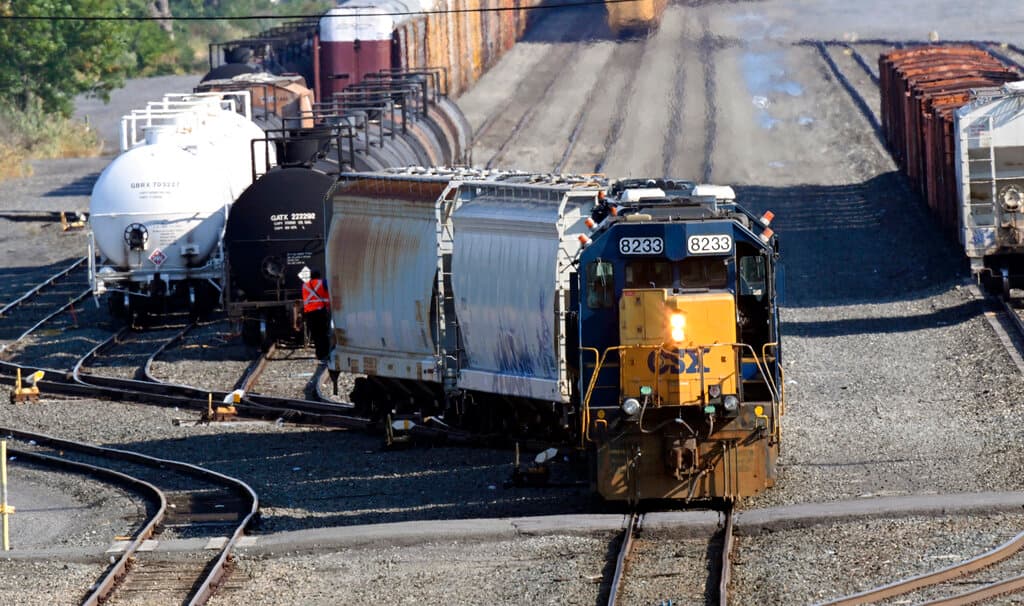To Avoid Rail Strike, Biden Administration Now Says Congress May Need To Step Up
The labor secretary’s comments directly contradict earlier statements from the White House that involving Congress in the dispute would be ‘misguided.’

After insisting for weeks that averting a national railroad strike was the responsibility of industry leaders and the unions they work with, the Biden administration has reversed itself and is now saying Congress may need to step in to head off a crisis that could potentially paralyze the nation’s economy just before Thanksgiving.
Speaking to media outlets Friday, the labor secretary, Marty Walsh, said he is hopeful the two sides will hammer out their differences at the bargaining table, but if they aren’t able to do it then “Congress will have to take action to avert a strike in our country.”
Mr. Walsh’s statement directly contradicts recent signals from the White House on the subject. At a White House briefing October 26, the press secretary, Karine Jean Pierre, said the administration’s position is that it is up to the unions and railroad management to avert a strike and that “any idea that kicking this to Congress will result in a quick or favorable outcome is just deeply misguided.”
Mr. Walsh’s comments came just one day before one of the dozen unions at the center of the dispute, the International Association of Machinists and Aerospace Workers, narrowly approved a deal agreed upon between the leaders of the union and key players in the industry such as Norfolk Southern, Union Pacific, BNSF, Kansas City Southern, and CSX.
Seven of the unions’ rank-and-file members have now ratified the deal — announced with much fanfare by the Biden administration in September — which includes 24 percent pay raises and one-time bonuses of as much as $5,000 per worker. Average salaries in the industry would increase to $110,000 a year if the deal goes through, one of the largest pay increases in the industry in decades.
Members of all 12 of the unions must approve the deal if a strike is to be averted. Two of the unions have so far rejected it. Members of the Brotherhood of Maintenance of Way Employees Division and the Brotherhood of Railroad Signalmen unions voted down their respective contracts last month, with many of them complaining that the deals don’t address the members’ concerns about quality-of-life issues.
The unions’ primary gripe revolves around paid sick time for their members. Railroads have so far rejected their demands, saying that the higher wages are intended to offset their concerns about sick time and that the unions have for years agreed to forego paid sick leave in favor of better wages and strong short-term disability benefits.
Three other unions are scheduled to vote later this month, including the largest ones that represent engineers and conductors. The unions have agreed not to strike while the talks continue, but that promise is out the window after November 19.
Business groups have warned the administration that a national strike would virtually paralyze the economy and wreak havoc on an already stressed supply chain, with the movement of goods grinding to a halt around the country. Some have estimated that a strike could cost the economy as much as $2 billion a day.
Biden administration officials were front-and-center when the tentative deal to avert a strike was announced in September. Now that things are unraveling, however, they appear to be punting the issue to Congress, which has the power to block a strike and force the union members to accept the offer on the table.
Representatives of one of the unions that have already authorized a strike, the Maintenance Way employees, insisted that Congress should not get roped into the dispute.
“Congress should not have to intervene. The railroads should provide paid sick leave to its employees,” a union representative told CNN. “They have the money to do it, and it literally would cost them a penny of every dollar of record profits to provide it. It’s only two percent of what CSX, NS, and UP spent so far this year in stock buybacks. It’s literally nothing to them, yet they refuse to provide it.”

